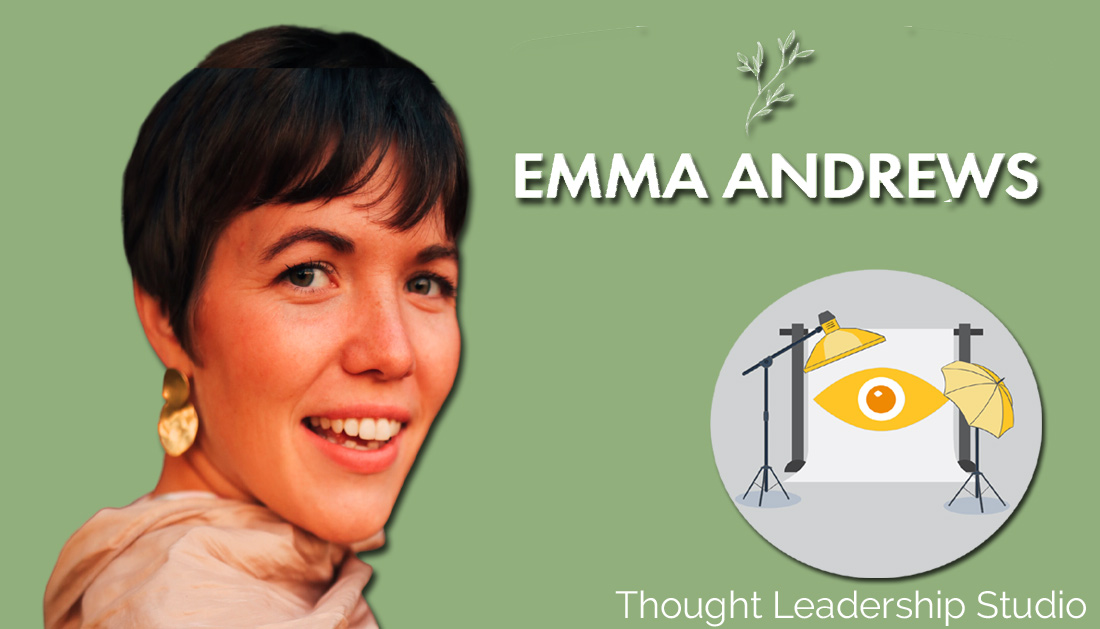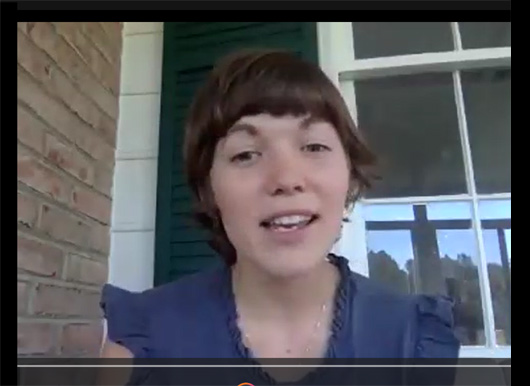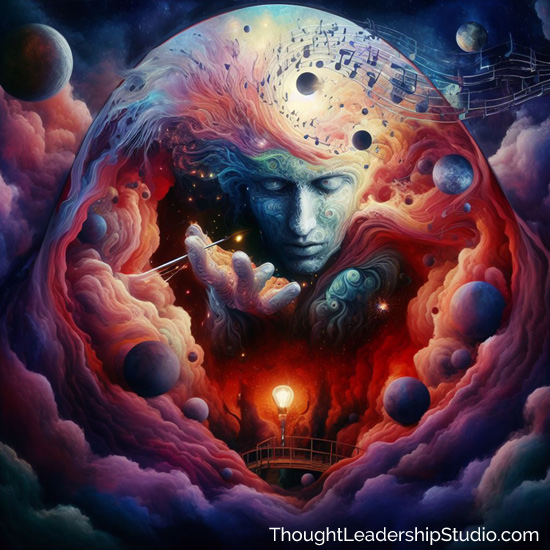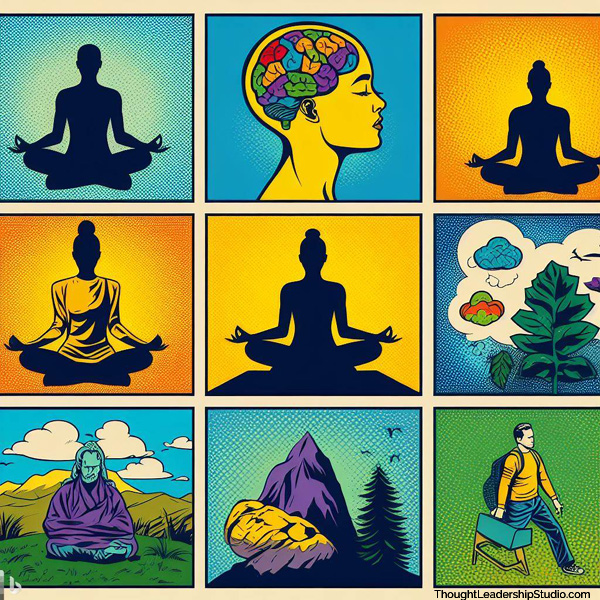Thought Leadership Studio Podcast Episodes:
Embracing Intuition and Unveiling Inner Magic with Emma Andrews
Episode 56- Tap into your intuition and unleash your creative potential.

#creativity, #imagination, #inspiration, #interviews, #intuition, #josephcampbell, #lifebalance, #mentaltraining
Or Click here to listen or subscribe on appWhat this episode will do for you
:- Unlock Your Intuition: Learn how to tap into your innate intuitive abilities and unleash your creative potential.
- Overcome Limiting Beliefs: Discover practical strategies to break free from self-imposed limitations that hinder your personal and professional growth.
- Meditation for Creativity: Explore the role of meditation in enhancing your creativity and intuition. Emma Andrews shares insights on how meditation can help you access your inner wisdom.
- Embrace Your Inner Artist: Recognize that creativity is not limited to a select few. Everyone possesses creative potential, and Emma explains how to harness this creativity in a business context.
- Transform Your Motivations: Understand the importance of shifting your motivations from fear-based thinking to passion, joy, and alignment with your authentic self.
Emma Andrews.
Meet Emma Andrews: Embracing Intuition and Unveiling Inner Magic.
Emma Andrews, an intuitive coach and guide, embarked on a transformative journey of self-discovery, unlocking the power of intuition and inner magic. As the eldest of five children, Emma's early life revolved around caring for her siblings and tending to others' emotional needs. However, a pivotal moment during her university years, when she faced a chronic illness, set her on an inward journey.
Over a decade, Emma learned to prioritize her own needs, connect with her body and emotions, and gradually tap into her intuitive gifts. A significant turning point came during a meditation, where she received a profound message, foretelling a family tragedy. This marked the undeniable reality of her intuitive abilities.
Amidst confusion and fear, Emma devoted herself to understanding and harnessing her gifts. She found that everyone possesses intuitive abilities, yet they often remain unexplored. Intuition, she realized, is about creating a sacred space for life's magic to flow freely.
Emma's passion for connecting with intuition led her to work regularly with clients, witnessing the transformative impact of intuition and mediumship. She aims to empower others to unlock their intuitive potential through her program, 'The Intuitive Method,' offered as an online coaching course and one-on-one sessions.
Join us on a journey with Emma Andrews as we explore the enchanting world of intuition and the inner magic waiting to be harnessed.
Some of Emma's coordinates:
Curated Transcript of Interview with Emma Andrews
The following partial transcript is lightly edited for clarity - the full interview is on audio. Click here to listen.
Chris McNeil: I'm Chris McNeil, with Thought Leadership Studio, and I'm sitting here with Emma Andrews who does intuitive training work. Welcome, Emma.
 Emma Andrews: Thank you so much for having me, Chris.
Emma Andrews: Thank you so much for having me, Chris.
Chris McNeil: Great to have you. How do you teach intuition and was there a pivotal moment we like talk about pivotal moments. Was there a pivotal moment that led you into doing this kind of work?
Emma Andrews: Yes, absolutely. So I grew up highly sensitive, highly empathetic. I could sense how other people were feeling and I was always trying to make them feel better. So I came from this background of being highly empathetic and people pleasing, but I didn't consider myself an intuitive and I didn't know what intuition was until I had some amazing experiences connecting with my intuition and having the information that I got confirmed over and over and over again.
And the reason that I'm so passionate about teaching intuition and working with intuition is because everyone has intuition. It's not a gift for a few people, it's for every single person. It's an important part of being human. And the way that we can connect with our intuition is by becoming present and connecting with our highest good. So connecting with a feeling of safety and creating a feeling of safety for ourselves is a really essential point.
Creating Space Away from Thought for Intuitive Guidance
And then whatever practice you have, whether it's meditating, clearing the mind, doing exercises that let go of your mental information and your thoughts, what that does is it creates space for inspiration, innovation, creativity, new insights to flow into your awareness. Now, a great example I like to give is if you're trying to figure out a problem and you just can't find the solution, maybe it's interpersonal.
That happens a lot with businesses where you just can't see eye to eye, you can't get on the same page and you just can't find that solution. But then maybe you go for a bike, mountain bike ride, or you go on a walk and all of a sudden it doesn't feel like a problem anymore. The solution presents itself to you, or a new avenue or a new path comes into your awareness. And the reason why that happens is because you've created space away from your thoughts and created space for that intuitive guidance to flow in and give you those answers.
Chris McNeil: Interesting. In my world, sometimes we would call that the distinction between conscious processing and working with the unconscious mind, creating space for the unconscious mind to release things to us. Does that make sense?
 Emma Andrews: Totally. That's exactly right. Yeah. I mean, the way I understand it is that that unconscious mind, it's also connected to an entire web of life and energy. So we're not just bringing forward insights and inspirations that are from ourselves, inspiration comes from other from, it's just in amounts that we could have never dreamed.
Emma Andrews: Totally. That's exactly right. Yeah. I mean, the way I understand it is that that unconscious mind, it's also connected to an entire web of life and energy. So we're not just bringing forward insights and inspirations that are from ourselves, inspiration comes from other from, it's just in amounts that we could have never dreamed.
Connecting with Unconscious Flow like an Artist or Musician
And from outside of us too, we can let that in to bring that inspiration and creativity and we can be a sort of channel for this innovation and creativity. When you see artists, really amazing artists or musicians, they'll often say, it's not all coming from me. I connect into this flow state. I connect with this unconscious place and this genius or this, this immense work comes through me and comes through my body and into my present life.
Chris McNeil: That makes a lot of sense to me from the standpoint of Jungian psychology as well, where he made distinction between the personal unconscious and the collective unconscious and the ability to tap into what he called archetypes. Some might also call immutable principles, timeless aspects of quote ourselves, but our greater selves that are outside of the ego. And it really seems to be a common thing for great artists to say things like that. The song just came through me. I can't claim that I wrote it because it was outside of that part of myself, that I would call the ego.
Emma Andrews: Yeah. So what I want to share with your listeners is that they're all artists and they're all intuitive. That creativity that's here for all of us, and a lot of us, we get told these stories like, oh, you're not good at this, or you're not an artist, or you're not creative. And then we live in that reality that we're not, and that's such a lie. Every single person is an artist and is creative and has that intuitive connection that's a part of being human.
So in a business context, when you're creating a business, that's creativity, right? You're creating something in the world. You're manifesting something in the world that wasn't there before.
Chris McNeil: Well, creativity is one of the highest prized assets in executives now is on the front cover of both Inc Magazine and Success Magazine, how highly prized the asset of creativity is now in business. But you mentioned a minute ago about how people can limit themselves based on maybe belief systems. Like they had a music teacher in a second grade who told them they weren't musical. Now they adopt this belief system that they're not creative.
And you work with people on accessing their intuition, their inspiration, their creativity, their muse. How do you work with people to overcome these kinds of belief systems?
Emma Andrews: That's a really awesome question, Chris. Well, it's quite a process. You have to step towards this direction, step towards this new way of being in the world that you want. You have to want to change. You have to want to change your mindsets on things. You have to want to live in a better way and be more aligned to you because, and all of us have to walk this path. 99% of the world has to walk this path.
It's a part of growing up when we become aware of how much of who we are is conditioned and get curious about where our authentic selves are and our authentic passions are authentic desires. And the most successful businesses in the world are the ones that are the people that are aligned with that passion. They've aligned their passion and what they truly love with service for the world, with offering that for the world. Those are the most ...
The Potential Discomfort of Discovering Your Authentic Self
Chris McNeil: ... My understanding is you're saying that it's about wanting to step outside of your former self because you see the limitations in self-imposed limitations, so to speak, and self-imposed belief systems or belief system we picked up about or limitations that may block us from getting aligned with that inner creativity. That's interesting.
Emma Andrews: That's right. You have to want to change because also the change, it's going to be a little disruptive, getting curated about who you are because, well, perhaps you might discover you want to be a musician or that you love music, and that might be uncomfortable because your whole life, you've been told, oh, you're a writer and you need to just write. And you're in a job where you write all the time, but you're not happy.
And so if really opening your eyes and seeing what's going on in your life, that can be scary for a lot of people. So that's why, and it makes total sense. But that's why the first thing is wanting that change is having that desire to discover more about yourself and to align with your true passions.
Chris McNeil: And suppose someone does that the aligns with their true passions, something wakes up in them. You made me think of the hero's journey model.
Emma Andrews: Exactly.
Chris McNeil: You say that of leaving the ordinary world, and a herold usually calls you. So maybe something happens where somebody says, Hey, you need to answer this higher calling. Or maybe that's small voice within, it's kind of an inner journey too, isn't it? And you leave the ordinary world in exchange for the magical world, and you overcome these guardians of the threshold. So who would be the guardian of the threshold in accessing our intuition and how would we overcome them?
Bilbo Leaving the Shire- The Hero's Journey
Emma Andrews: I love that metaphor. I'm just imagining Bilbo like leaving the shire.
Chris McNeil: Exactly. Yeah. That was a great hero's journey type story.
Emma Andrews: Yeah. Leaving the shire. So that's the feeling, right, of stepping out into the unknown that like, ah, I don't know what's going to happen. I dunno who I'm going to be without all of these constructs of stories that people have told me, that I've told myself is who I am and what I care about. So as you go on the journey, well, one thing that I think might be interesting for your listeners to get curious about is their motivations behind the things they do and behind their business.
 And this is a really good step, a good path to start to walk and practice to have, because your motivations behind things are always going to reveal those blocks that you have in your path. So a lot of people live most of their lives being motivated by fear. And how that feels is I need to get that promotion because I'm not enough.
And this is a really good step, a good path to start to walk and practice to have, because your motivations behind things are always going to reveal those blocks that you have in your path. So a lot of people live most of their lives being motivated by fear. And how that feels is I need to get that promotion because I'm not enough.
I'm not deserving of love. I haven't done enough this place of lack and scarcity. And if we can recognize that, if we can see, it's not about changing things at first. It's just about noticing like, oh, I'm working myself so hard today. What's my motivation for that? What's my motivation for working till 10:00 PM? Is it because I'm really excited and passionate, or is it because I'm afraid that I'm falling behind?
If we can recognize that, then we can shine a light on that area and begin to heal those places that perhaps are calling out for our right. Because if we want to channel beautiful, intuitive information, we have to be able to be grateful for the moment that we have and feel the love in the moment that we have right now, one of the most important things about connecting with your intuition is being able to raise your vibration. And what that is is going on that mountain bike ride or going on that walk, connecting with things that make you feel good and allowing yourself to feel good in the moment. So if we start questioning our motivations behind things, then we can start to imagine, okay, if I was motivated by passion, by excitement, by joy, what kind of things would I do and what would that feel like in my life?
Meditation as a Gateway
Chris McNeil: Oh, that's an awesome question to ask. And I imagine asking that question for a lot of people would bring up facing these obstacles within themselves, and that's the first part of overcoming those obstacles, isn't it? And I imagine meditation could play a big part in that, and just seeking that quiet space inside yourself and being centered on that. What do you think about meditation as a practice for people wanting to enhance their creativity?
Emma Andrews: Absolutely. Meditation is an awesome gateway, and meditation was my gateway to intuition. That's how I discovered my intuition was I was practicing meditating. I was practicing being present in my body and letting the thoughts pass and not attaching to them. And that's when I began to notice that there was another voice behind my thoughts. There was me really, truly Emma sitting behind observing the thoughts, and there was a voice there that was really so loving and giving me really amazing guidance for my life, decisions to make for my life.
So meditation, I highly recommend, and if anyone's listening has tried meditation and it hasn't worked for them, I would encourage them to try again. But let go of that idea that meditation has to be still and quiet, because a lot of people, especially a lot of people who are probably listening to this are really active go getters, thinkers.
 They need a lot going on. They need that stimulation. And so just being like, oh, I just have to sit and be quiet and my thoughts go away. We can feel like, oh, I failed. Right? We can become really critical. I can't do this meditation thing. My brain is always going when you're not failing at all. And the way I like to meditate is with moving. So I'll sit in a quiet place, but if I need to move, I'll move or stretch, or I'll go sit outside in the sun and stand and have my eyes open or closed. So pay attention to what your system needs, and don't be afraid to move and don't think you're failing if you have lots of thoughts that are in there all the time.
They need a lot going on. They need that stimulation. And so just being like, oh, I just have to sit and be quiet and my thoughts go away. We can feel like, oh, I failed. Right? We can become really critical. I can't do this meditation thing. My brain is always going when you're not failing at all. And the way I like to meditate is with moving. So I'll sit in a quiet place, but if I need to move, I'll move or stretch, or I'll go sit outside in the sun and stand and have my eyes open or closed. So pay attention to what your system needs, and don't be afraid to move and don't think you're failing if you have lots of thoughts that are in there all the time.
That's just a part of it. And when we slow down and notice them, sometimes we can be like, holy shit, this is a lot all day with all of this going on. This is crazy. And we can be like, okay, too much. Take a break, but just stick with it and be patient and just noticing it's a lot. That's a win, and that's a successful meditation. If you can just notice the thoughts that are coming in and how it makes you feel.
Chris McNeil: You remind me of something I read one time about meditation, not necessarily being about being in that total quiet place, but training yourself to notice when you're not and just gradually growing in your awareness of your internal dialogues. And just by, instead of trying to shut it down, then you've got one voice saying, be quiet over there to the other voice. Now you got two of 'em going on. Instead, just accept it, but be aware of it. And by being aware of it and watching it be gradually dissipate.
Emma Andrews: Yep. Well, it might not gradually dissipate, and that can freak people out at first. Well, through practice it will become quieter. But the problem and what can be tricky for people, and this'll help bring some clarity. So our mind, our mental thoughts are really loud and they're really emotionally charged. And so if we never learn any different, we think that we have to believe all of our thoughts, and we have to value them and move from them. So say we're having thoughts, I need to write that email, or I need to go to this.
I need to connect with this person. I need to do this. I need to do this so that there's an emotional charge there of worry or fear. I have to go do this. There's a time limit to it that's mental thoughts. They're always fear-based and they're really, really loud. So meditating, it would be amazing if you're going to try meditating, just notice that the loudness and the density of those thoughts and see if you can sort of let them pass. And there might be a steady stream of them and it might not let up, but just see if you can let them pass without attaching to them or believing them or feeling like you have to jump up and go do the thing. It's telling your brain is telling you to do.
Chris McNeil: So separating.
Separate from Thought and Have Power Over Yourself
Emma Andrews: Yeah, it's about separating and having power over yourself. So many of us are just at the mercy of our minds and at the mercy of our thoughts. So your brain is controlling you, and it doesn't need to be that way. You can be in control. Your authentic self can be in control and say, oh, honey, I know you're worried about that, but it's okay. We'll get to it. I'm going to connect in with what I really need right now, or what's the best decision to make?
I know you're saying, you're saying, I need to do X, Y, and Z, but I know that I don't need to do that, and I know there's no rush. Right? That's an example of how our brains really lie to us is we feel like there's a rush, but we might know there's not a rush, but how can we feel like there's a rush? That's the lie that our brains are telling us.
Chris McNeil: Is it like being in a hurry to get to that point in the future where I can live in the present?
Emma Andrews: Yeah, exactly. We're always in this hurry, but when that moment comes, it's never going to come. Right?
Chris McNeil: It (not living in the moment) is a habit at that point.
 Emma Andrews: Right? So making that moment happen now. And letting those thoughts pass, and then you'll be able to notice a subtler voice, a softer voice. So your intuitive voice is emotionally neutral and it's really soft and quiet. So your brain is going to be yelling at you, Hey, you're missing out. You're doing terribly. You're failing. Do this, do this. Your brain's going to be screaming that at you, but your intuition is going to say, Hey, remember that person you met the other day? Maybe you should reach out. You could if you want to.
Emma Andrews: Right? So making that moment happen now. And letting those thoughts pass, and then you'll be able to notice a subtler voice, a softer voice. So your intuitive voice is emotionally neutral and it's really soft and quiet. So your brain is going to be yelling at you, Hey, you're missing out. You're doing terribly. You're failing. Do this, do this. Your brain's going to be screaming that at you, but your intuition is going to say, Hey, remember that person you met the other day? Maybe you should reach out. You could if you want to.
It's really subtle, but it's going to give you that little guidance. Have you ever woken up in the middle of the night or in the morning with like, oh my gosh, yeah, I should do that. Or, gosh, that's a great idea, or with that insight and inspiration, that's because your brain has been in a theta state, which is the state that when we connect with our intuition, we're more open to it. So it's really a valuable thing to be able to come out of that activation and being that I keep wanting to say like a slave to our minds. Coming out of that place.
Chris McNeil: Just giving yourself permission to take a break from the grind, whether that's internal or external or both. I was approached by this firm not too long ago about building my coaching and consulting practice. I'm like, the thing is doing pretty good. And they're like, well, we can have your schedule packed. That's the ideal, to have a back-to-back schedule all day long. I'm like, well, most of the work I do for my clients comes from the ideas I get when I'm contemplating their issues away from doing something, not when I'm doing something. So I don't think I'm adding as much value if I don't take time.
And I know in the field of Systems Thinking, which became more popular when Peter Senge wrote The Fifth Discipline, and that was a while back. But I think systems thinking is really powerful. It's a lot of weight given to time to reflect and reflect on the issues, study things as a system, but then step back and reflect on it. And that's when the ideas come to you. But I don't think in our daily world where people have an average of six to seven hours a day of screen time, that people are taking enough time to look in their own internal screen instead.
That's extremely important. So you do work with teaching groups and also individual coaching, is that right? So what kind, well, I was going to ask you for some practical steps that you might take a client or a group through that could apply to our listeners who want to increase their intuition, their ability to reflect, their ability to access their creativity and their inspiration.
Emma Andrews: Absolutely. I would love to share something, and I have just for your listeners, I love that you said your inner screen, because I have a free meditation on my website called a home screen meditation, and it activates your inner screen where you can connect with yourself, your inner child, your guides, whoever you'd like. You can get that place and do inner work through this practice.
So that's free on my website for whoever wants to go and access that. And I also want to say what you were saying before, I loved it so much that taking that break and taking that step away and that rest, how important that is for your creativity. But it's also what makes a great leader when you're leading not from an activated place, but from a centered, wise place of connection to yourself, where you feel secure, where you feel strong in yourself first, and then other people will want to follow you, and you'll gain other people's trust by doing that.
Chris McNeil: I agree a hundred percent.
Emma Andrews: Okay, so can I lead us in a little exercise?
Chris McNeil: Absolutely
***************************************
The transcript is lightly edited for clarity and is a partial transcript- the full interview is on audio. Click here to listen.
***************************************
Free Stuff and Offers Mentioned in Podcast
***************************************
X
***************************************